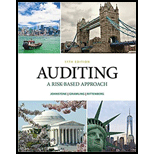
MINISCRIBE
(LO 1, 2)
As reported in the Wall Street Journal (September 11, 1989), MiniScribe, nc., inflated its reported profits and inventory through a number of schemes designed to fool the auditors. At that time, MiniScribe was one of the major producers of disk drives for personal computers. The newspaper article reported that MiniScribe used the following techniques to meet its profit objectives:
• An extra shipment of $9 million of disks was sent to a customer near year-end and booked as a sale. The customer had not ordered the goods and ultimately returned them, but the sale was nor reversed in the year recorded.
• Shipments were made from a factory in Singapore, usually by air freight. Toward the end of the year, some of the goods were shipped by cargo ships. The purchase orders were changed to show that the customer took title when the goods were loaded on the ship. However, title did not pass to the customer until the goods were received in the U.S.
• Returned goods were recorded as usable inventory. Some were shipped without any repair work performed.
• MiniScribe developed a number of just—in—time warehouses and shipped goods to them from where they were delivered to customers. The shipments were billed as sales as soon as they reached the warehouse.
For each of the techniques described, identify the audit evidence that might have enabled the auditor to uncover the fraud.
Want to see the full answer?
Check out a sample textbook solution
Chapter 6 Solutions
AUDITING-TEXT (LOOSELEAF)
 Auditing: A Risk Based-Approach (MindTap Course L...AccountingISBN:9781337619455Author:Karla M Johnstone, Audrey A. Gramling, Larry E. RittenbergPublisher:Cengage Learning
Auditing: A Risk Based-Approach (MindTap Course L...AccountingISBN:9781337619455Author:Karla M Johnstone, Audrey A. Gramling, Larry E. RittenbergPublisher:Cengage Learning Cornerstones of Cost Management (Cornerstones Ser...AccountingISBN:9781305970663Author:Don R. Hansen, Maryanne M. MowenPublisher:Cengage Learning
Cornerstones of Cost Management (Cornerstones Ser...AccountingISBN:9781305970663Author:Don R. Hansen, Maryanne M. MowenPublisher:Cengage Learning Auditing: A Risk Based-Approach to Conducting a Q...AccountingISBN:9781305080577Author:Karla M Johnstone, Audrey A. Gramling, Larry E. RittenbergPublisher:South-Western College Pub
Auditing: A Risk Based-Approach to Conducting a Q...AccountingISBN:9781305080577Author:Karla M Johnstone, Audrey A. Gramling, Larry E. RittenbergPublisher:South-Western College Pub


